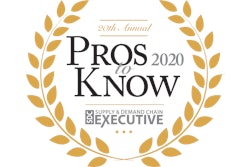
The first question supply chain management companies or teams considering using blockchain technology should ask is: ‘Should I use a database instead'? The frank answer is: Yes, but only if you are not sharing valuable or vulnerable information. If you need to collaborate or share large volumes of valuable data, then blockchain is certainly the best way to do so.
Blockchain technology can help with streamlined data storage and management, multi-party supply chain benefits, and it can help build trust through traceability and transparency.
Streamlined data storage and management
Firstly, let’s think about the facts: no company wants to allow other people to poke around inside their database, and no successful business can run the risk of relying on data stored in somebody else's database. This is where blockchain technology can come in to benefit supply chains.
The blockchain network is built in a way so that no data enters into the records until the majority of participants agree that it is ‘valid’. This validity checking is done through a clever system where computers work together to process and cross-check each transaction. This whole process is based around the creation of a ‘data lake’, which is essentially a large pool of stored unstructured and structured data that allows for multiple points of collection and access.
By using blockchain this way, businesses can ensure they only store data that has already been validated by all participants in their supply chain. This removes the need for data to be re-checked, streamlining the business’ data management process.
For context, let’s look at a real-life example involving meat shipments. Using blockchain technology, a consumer who wants to purchase imported beef can view all of the associated data that confirms the origin of the beef. They can view key information about where the animal was raised, the breeding data, what the animal was fed, and, in Australia, they can even access certified documentation from government bodies such as the Meat & Livestock Australia (MLA). On top of this, Internet of Things (IoT) data regarding heat, humidity, GPS, and other factors, are also made available, which can confirm the conditions under which the goods were shipped or warn participants when there are any anomalies. This also highlights the true potential of blockchain technology in ensuring producers can protect their brand from fake products, and reassuring consumers that the products they are buying are legitimate and safe to consume.
Multi-party supply chain benefits
A supply chain comprised of multiple parties is another great example of where it makes sense to have a data lake that each participant can rely on.
To demonstrate what we mean, let’s take a look at the medicinal marijuana industry. Right now, Aglive is part of a medicinal cannabis industry study spearheaded by the NSW Department of Primary Industries, which aims to ensure patients receive safe doses for treatment. This industry-led study was initiated by Cann Group Limited, which is the first company to be issued a Medical Cannabis License and Cannabis Research License by the Australian Government. Our experience has shown that the medicinal cannabis supply chain industry is complex in Australia, as different states have different laws. This makes it challenging for industry participants to ensure that distributed medicine is safe, complies with applicable laws, and is delivered safely. In addition to these supply chain issues, there are also additional lab testing results that are crucial to ensure safe and reliable dosages.
Over time, this data must be swapped with other medical blockchains that handle related information such as prescriptions, pharmacy records, and patient records. This process is referred to as ‘Interoperability’, which essentially describes the need for data to freely flow between different blockchains. It is a bit like booking a hotel: you just want a room in that city. You don’t really care what systems gather the information or how that information flows to you. At the end of the day, all you really care about is the outcome, not the process. This same idea applies to how blockchain technology can be used within supply chains, including those in the pharmaceutical industry.
Building trust through traceability and transparency
Finally, blockchain technology enhances traceability and transparency in data management. We have seen this through the beef industry and pharmaceutical industry examples above.
Likewise, traceability and transparency throughout the supply chain now means that consumers can be sure they are getting what they paid for. Food fraud has been a growing concern across the globe, with the media reporting several prominent cases over the past decade. For example, last year’s “fake fish” scandal that occurred in New York saw high levels of seafood fraud found at supermarkets across the state. With the spotlight now on regulatory compliance and the trustworthiness of supply chains, it is more crucial than ever that businesses adopt blockchain technology to ensure they are properly monitoring their goods throughout their supply chain. There is now a higher social expectation for transparency and traceability, all of which can be provided through blockchain technology. By adopting the new technology, businesses can allow consumers to check the origins of their purchased products and ensure it came from a trusted source.
So, where to from here?
Technology continues to change many aspects of our lives. The tempo of that change is increasing, and the changes are now making their way into the more mundane areas of life. It is not just affecting the way we buy and sell goods and services; we are now changing the base processes of how we conduct day-to-day business. The duplication, waste, and frustrations of paper-based data management systems will soon be bypassed by efficient, cost-effective processes that also deliver greater certainty.
In a world where food fraud is becoming a growing concern, it is imperative that businesses are aware of the risks associated with traditional databases. Producers can (and should) rely on blockchain technology to protect their brand from fake products, which will, in turn, assure their customers that the products they are buying will not harm their loved ones.



















